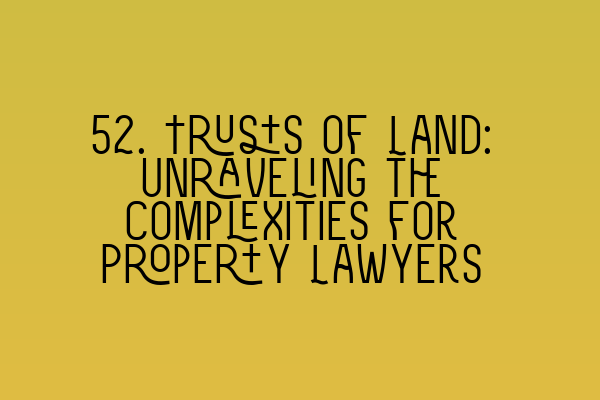52. Trusts of Land: Unraveling the Complexities for Property Lawyers
Welcome to the SQE Property Law & Land Law blog! In this post, we will delve into the intricate world of Trusts of Land. As property lawyers, it is crucial to understand the complexities of this area of law to provide the best advice to our clients. So, let’s unravel the mysteries and gain a comprehensive understanding of Trusts of Land.
What are Trusts of Land?
A Trust of Land, also known as a TOLATA trust (Trusts of Land and Appointment of Trustees Act 1996), arises when two or more people have an interest in a property, whether it be residential or commercial. This type of trust can be established by agreement, declaration, or operation of law.
As property lawyers, it is important for us to understand the different types of trusts that can arise in relation to land. These may include express trusts, resulting trusts, constructive trusts, or even statutory trusts. Each type of trust has its own set of legal principles and requirements that we must navigate through.
Key Considerations for Property Lawyers
When dealing with Trusts of Land, there are several key considerations that property lawyers must keep in mind:
- Identifying the Trust: First and foremost, it is essential to identify whether a trust exists and its particular nature. This requires a careful examination of the facts and circumstances surrounding the property and the interests of the parties involved.
- Trustee Responsibilities: Once a trust is established, it is important to understand the duties and responsibilities placed upon the trustees. These may include managing the property, making decisions regarding its use or sale, and accounting for any income or expenses.
- Beneficiary Rights: As property lawyers, we must also consider the rights of the beneficiaries. This may involve assessing their beneficial interests, considering any trust documentation, and ensuring that their rights are protected.
- Trustee Powers: Trusts of Land are governed by the Trustee Act 2000, which sets out the statutory powers and duties of trustees. Understanding these powers is crucial when advising clients on trust matters.
Resolving Disputes in Trusts of Land
Unfortunately, disputes can arise in relation to Trusts of Land. These disputes may involve disagreements between co-owners, questions over beneficial interests, or disputes regarding the management or sale of the property. As property lawyers, it is our role to help resolve these disputes in a fair and efficient manner.
In some cases, negotiation or mediation may be appropriate to reach a resolution. In other instances, litigation may be necessary to protect our clients’ interests. It is important to stay up to date with the latest case law and legal developments in this evolving area of law.
Stay Informed with SQE Property Law & Land Law
At SQE Property Law & Land Law, we strive to provide valuable resources and guidance to property lawyers. Our SQE 1 Practice Exam Questions and SQE 1 Practice Mocks FLK1 FLK2 can help you test your knowledge and prepare for the SQE exams.
If you are preparing for the SQE 2 exams, our SQE 2 Preparation Courses are designed to equip you with the necessary skills and knowledge to succeed. And if you are just starting your SQE journey, take a look at our SQE 1 Preparation Courses to kickstart your studies.
Lastly, stay up to date with the latest SRA SQE exam dates by visiting our SRA SQE Exam Dates page.
We hope this blog post has shed some light on the complexities of Trusts of Land for property lawyers. Remember to stay diligent in your research, keep learning, and provide the best possible advice to your clients.
If you have any other questions or need further guidance, do not hesitate to reach out to SQE Property Law & Land Law. We are here to support you in your legal journey!
